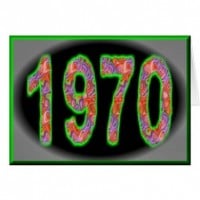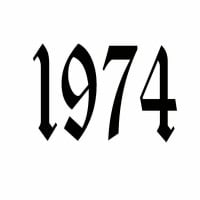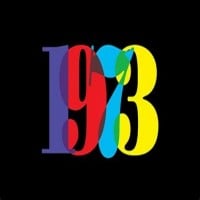Most Important Years in Music History
The Top Ten
1 1969
 In 1969, humanity achieved a monumental milestone as NASA's Apollo 11 mission successfully landed the first humans, Neil Armstrong and Edwin "Buzz" Aldrin, on the Moon. The Woodstock Festival, a symbol of the counterculture movement, brought together hundreds of thousands of people for a celebration of music and peace. This year also marked the debut of the Internet's precursor, ARPANET, which laid the foundation for the digital age.
In 1969, humanity achieved a monumental milestone as NASA's Apollo 11 mission successfully landed the first humans, Neil Armstrong and Edwin "Buzz" Aldrin, on the Moon. The Woodstock Festival, a symbol of the counterculture movement, brought together hundreds of thousands of people for a celebration of music and peace. This year also marked the debut of the Internet's precursor, ARPANET, which laid the foundation for the digital age.
 In 1969, humanity achieved a monumental milestone as NASA's Apollo 11 mission successfully landed the first humans, Neil Armstrong and Edwin "Buzz" Aldrin, on the Moon. The Woodstock Festival, a symbol of the counterculture movement, brought together hundreds of thousands of people for a celebration of music and peace. This year also marked the debut of the Internet's precursor, ARPANET, which laid the foundation for the digital age.
In 1969, humanity achieved a monumental milestone as NASA's Apollo 11 mission successfully landed the first humans, Neil Armstrong and Edwin "Buzz" Aldrin, on the Moon. The Woodstock Festival, a symbol of the counterculture movement, brought together hundreds of thousands of people for a celebration of music and peace. This year also marked the debut of the Internet's precursor, ARPANET, which laid the foundation for the digital age.
2 1967


At the Monterey Pop Music Festival, Hendrix stuns the world.
3 1991


Grunge rises to popularity, thanks to Nirvana, Pearl Jam, Soundgarden and Alice In Chains.
4 2001
 2001 (MMI) was a common year starting on Monday of the Gregorian calendar, the 2001st year of the Common Era (CE) and Anno Domini (AD) designations, the 1st year of the 3rd millennium and the 21st century, and the 2nd year of the 2000s decade.
2001 (MMI) was a common year starting on Monday of the Gregorian calendar, the 2001st year of the Common Era (CE) and Anno Domini (AD) designations, the 1st year of the 3rd millennium and the 21st century, and the 2nd year of the 2000s decade.
 2001 (MMI) was a common year starting on Monday of the Gregorian calendar, the 2001st year of the Common Era (CE) and Anno Domini (AD) designations, the 1st year of the 3rd millennium and the 21st century, and the 2nd year of the 2000s decade.
2001 (MMI) was a common year starting on Monday of the Gregorian calendar, the 2001st year of the Common Era (CE) and Anno Domini (AD) designations, the 1st year of the 3rd millennium and the 21st century, and the 2nd year of the 2000s decade.
5 1960


6 1970
 1970 saw the first celebration of Earth Day, raising awareness about environmental conservation and sustainability. The Beatles officially disbanded, marking the end of an era in music history. The Apollo 13 mission faced a crisis but ultimately returned safely to Earth, demonstrating NASA's expertise in managing space challenges.
1970 saw the first celebration of Earth Day, raising awareness about environmental conservation and sustainability. The Beatles officially disbanded, marking the end of an era in music history. The Apollo 13 mission faced a crisis but ultimately returned safely to Earth, demonstrating NASA's expertise in managing space challenges.
 1970 saw the first celebration of Earth Day, raising awareness about environmental conservation and sustainability. The Beatles officially disbanded, marking the end of an era in music history. The Apollo 13 mission faced a crisis but ultimately returned safely to Earth, demonstrating NASA's expertise in managing space challenges.
1970 saw the first celebration of Earth Day, raising awareness about environmental conservation and sustainability. The Beatles officially disbanded, marking the end of an era in music history. The Apollo 13 mission faced a crisis but ultimately returned safely to Earth, demonstrating NASA's expertise in managing space challenges.
7 1984
 The year 1984 holds a prominent place in literature due to George Orwell's dystopian novel of the same name. Apple Computer introduced the Macintosh, a revolutionary personal computer with a graphical user interface. The Los Angeles Summer Olympics showcased sporting excellence and saw the emergence of gymnast Mary Lou Retton as a household name.
The year 1984 holds a prominent place in literature due to George Orwell's dystopian novel of the same name. Apple Computer introduced the Macintosh, a revolutionary personal computer with a graphical user interface. The Los Angeles Summer Olympics showcased sporting excellence and saw the emergence of gymnast Mary Lou Retton as a household name.
 The year 1984 holds a prominent place in literature due to George Orwell's dystopian novel of the same name. Apple Computer introduced the Macintosh, a revolutionary personal computer with a graphical user interface. The Los Angeles Summer Olympics showcased sporting excellence and saw the emergence of gymnast Mary Lou Retton as a household name.
The year 1984 holds a prominent place in literature due to George Orwell's dystopian novel of the same name. Apple Computer introduced the Macintosh, a revolutionary personal computer with a graphical user interface. The Los Angeles Summer Olympics showcased sporting excellence and saw the emergence of gymnast Mary Lou Retton as a household name.
8 1979


9 1965


10 1989


A very good year for countless genres, such as rap/hip-hop, industrial, hard rock, heavy metal, alternative, indie, punk, just to name some.
The Contenders
11 1995


12 1964


The Beatles debut on Ed Sullivan. Although they were already popular in the UK and somewhat popular in Germany, this was their explosion out onto the world stage.
13 1988
 The year 1988 witnessed the establishment of the Intergovernmental Panel on Climate Change (IPCC) to address global environmental challenges. The Winter Olympics were held in Calgary, Canada, showcasing world-class winter sports competition. NASA's space shuttle program continued with the launch of the Space Shuttle Discovery, contributing to advancements in space exploration.
The year 1988 witnessed the establishment of the Intergovernmental Panel on Climate Change (IPCC) to address global environmental challenges. The Winter Olympics were held in Calgary, Canada, showcasing world-class winter sports competition. NASA's space shuttle program continued with the launch of the Space Shuttle Discovery, contributing to advancements in space exploration.
 The year 1988 witnessed the establishment of the Intergovernmental Panel on Climate Change (IPCC) to address global environmental challenges. The Winter Olympics were held in Calgary, Canada, showcasing world-class winter sports competition. NASA's space shuttle program continued with the launch of the Space Shuttle Discovery, contributing to advancements in space exploration.
The year 1988 witnessed the establishment of the Intergovernmental Panel on Climate Change (IPCC) to address global environmental challenges. The Winter Olympics were held in Calgary, Canada, showcasing world-class winter sports competition. NASA's space shuttle program continued with the launch of the Space Shuttle Discovery, contributing to advancements in space exploration.
14 1975


15 1994


16 2000
 The year 2000 (MM) was a century leap year that started on a Saturday according to the Gregorian calendar. It marked the 2000th year of the Common Era (CE) and Anno Domini (AD) designations. It was the last year of the 2nd millennium and the 20th century, and the 1st year of the 2000s decade.
The year 2000 (MM) was a century leap year that started on a Saturday according to the Gregorian calendar. It marked the 2000th year of the Common Era (CE) and Anno Domini (AD) designations. It was the last year of the 2nd millennium and the 20th century, and the 1st year of the 2000s decade.
 The year 2000 (MM) was a century leap year that started on a Saturday according to the Gregorian calendar. It marked the 2000th year of the Common Era (CE) and Anno Domini (AD) designations. It was the last year of the 2nd millennium and the 20th century, and the 1st year of the 2000s decade.
The year 2000 (MM) was a century leap year that started on a Saturday according to the Gregorian calendar. It marked the 2000th year of the Common Era (CE) and Anno Domini (AD) designations. It was the last year of the 2nd millennium and the 20th century, and the 1st year of the 2000s decade.
17 1990
 In 1990, the reunification of East and West Germany marked a historic moment in the aftermath of the Cold War. Tim Berners-Lee, a British computer scientist, introduced the concept of the World Wide Web, revolutionizing the way people access and share information. Nelson Mandela's release from prison in South Africa signaled the beginning of the end of apartheid.
In 1990, the reunification of East and West Germany marked a historic moment in the aftermath of the Cold War. Tim Berners-Lee, a British computer scientist, introduced the concept of the World Wide Web, revolutionizing the way people access and share information. Nelson Mandela's release from prison in South Africa signaled the beginning of the end of apartheid.
 In 1990, the reunification of East and West Germany marked a historic moment in the aftermath of the Cold War. Tim Berners-Lee, a British computer scientist, introduced the concept of the World Wide Web, revolutionizing the way people access and share information. Nelson Mandela's release from prison in South Africa signaled the beginning of the end of apartheid.
In 1990, the reunification of East and West Germany marked a historic moment in the aftermath of the Cold War. Tim Berners-Lee, a British computer scientist, introduced the concept of the World Wide Web, revolutionizing the way people access and share information. Nelson Mandela's release from prison in South Africa signaled the beginning of the end of apartheid.
18 1986


19 1985


20 1983
 1983 was a common year starting on Saturday of the Gregorian calendar, the 1983rd year of the Common Era and Anno Domini designations.
1983 was a common year starting on Saturday of the Gregorian calendar, the 1983rd year of the Common Era and Anno Domini designations.
 1983 was a common year starting on Saturday of the Gregorian calendar, the 1983rd year of the Common Era and Anno Domini designations.
1983 was a common year starting on Saturday of the Gregorian calendar, the 1983rd year of the Common Era and Anno Domini designations.
21 1978


22 1977
 1977 was a year of cultural significance with the release of the groundbreaking film "Star Wars," which sparked a global phenomenon and reshaped the science fiction genre. New York City's iconic Studio 54 nightclub became synonymous with disco culture and celebrity glamour. Voyager 1 and Voyager 2 were launched by NASA, embarking on a journey to explore the outer planets and beyond.
1977 was a year of cultural significance with the release of the groundbreaking film "Star Wars," which sparked a global phenomenon and reshaped the science fiction genre. New York City's iconic Studio 54 nightclub became synonymous with disco culture and celebrity glamour. Voyager 1 and Voyager 2 were launched by NASA, embarking on a journey to explore the outer planets and beyond.
 1977 was a year of cultural significance with the release of the groundbreaking film "Star Wars," which sparked a global phenomenon and reshaped the science fiction genre. New York City's iconic Studio 54 nightclub became synonymous with disco culture and celebrity glamour. Voyager 1 and Voyager 2 were launched by NASA, embarking on a journey to explore the outer planets and beyond.
1977 was a year of cultural significance with the release of the groundbreaking film "Star Wars," which sparked a global phenomenon and reshaped the science fiction genre. New York City's iconic Studio 54 nightclub became synonymous with disco culture and celebrity glamour. Voyager 1 and Voyager 2 were launched by NASA, embarking on a journey to explore the outer planets and beyond.
23 1976
 The United States celebrated its bicentennial in 1976, marking 200 years since the Declaration of Independence. The Summer Olympics were held in Montreal, Canada, featuring memorable moments like Nadia Comăneci's perfect gymnastics score. The Viking 1 spacecraft successfully landed on Mars, providing valuable insights into the Red Planet.
The United States celebrated its bicentennial in 1976, marking 200 years since the Declaration of Independence. The Summer Olympics were held in Montreal, Canada, featuring memorable moments like Nadia Comăneci's perfect gymnastics score. The Viking 1 spacecraft successfully landed on Mars, providing valuable insights into the Red Planet.
 The United States celebrated its bicentennial in 1976, marking 200 years since the Declaration of Independence. The Summer Olympics were held in Montreal, Canada, featuring memorable moments like Nadia Comăneci's perfect gymnastics score. The Viking 1 spacecraft successfully landed on Mars, providing valuable insights into the Red Planet.
The United States celebrated its bicentennial in 1976, marking 200 years since the Declaration of Independence. The Summer Olympics were held in Montreal, Canada, featuring memorable moments like Nadia Comăneci's perfect gymnastics score. The Viking 1 spacecraft successfully landed on Mars, providing valuable insights into the Red Planet.
24 1974


25 1973
 The year 1973 was marked by significant global and cultural events. In the United States, the Watergate scandal reached a critical point, leading to investigations that would eventually culminate in President Richard Nixon's resignation the following year. The Vietnam War officially ended for the U.S. with the signing of the Paris Peace Accords. Globally, the Yom Kippur War broke out in the Middle East, resulting in an oil crisis that affected many countries. In technology, the first handheld mobile phone call was made by Martin Cooper, an engineer at Motorola. The Roe v. Wade decision by the U.S. Supreme Court legalized abortion, significantly impacting social and legal debates in the country. ...read more.
The year 1973 was marked by significant global and cultural events. In the United States, the Watergate scandal reached a critical point, leading to investigations that would eventually culminate in President Richard Nixon's resignation the following year. The Vietnam War officially ended for the U.S. with the signing of the Paris Peace Accords. Globally, the Yom Kippur War broke out in the Middle East, resulting in an oil crisis that affected many countries. In technology, the first handheld mobile phone call was made by Martin Cooper, an engineer at Motorola. The Roe v. Wade decision by the U.S. Supreme Court legalized abortion, significantly impacting social and legal debates in the country. ...read more.
 The year 1973 was marked by significant global and cultural events. In the United States, the Watergate scandal reached a critical point, leading to investigations that would eventually culminate in President Richard Nixon's resignation the following year. The Vietnam War officially ended for the U.S. with the signing of the Paris Peace Accords. Globally, the Yom Kippur War broke out in the Middle East, resulting in an oil crisis that affected many countries. In technology, the first handheld mobile phone call was made by Martin Cooper, an engineer at Motorola. The Roe v. Wade decision by the U.S. Supreme Court legalized abortion, significantly impacting social and legal debates in the country. ...read more.
The year 1973 was marked by significant global and cultural events. In the United States, the Watergate scandal reached a critical point, leading to investigations that would eventually culminate in President Richard Nixon's resignation the following year. The Vietnam War officially ended for the U.S. with the signing of the Paris Peace Accords. Globally, the Yom Kippur War broke out in the Middle East, resulting in an oil crisis that affected many countries. In technology, the first handheld mobile phone call was made by Martin Cooper, an engineer at Motorola. The Roe v. Wade decision by the U.S. Supreme Court legalized abortion, significantly impacting social and legal debates in the country. ...read more.8Load More
PSearch List